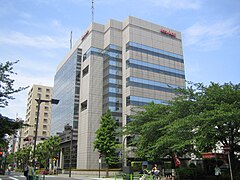Nisshinbo Holdings
 | |
 Nisshinbo headquarters building in Tokyo | |
Native name | 日清紡ホールディングス株式会社 |
|---|---|
| Company type | Public (K.K) |
| TYO: 3105 | |
| ISIN | JP3678000005 |
| Industry | Diversified industrials |
| Founded | (February 5, 1907) |
| Headquarters | Nihonbashi, Chuo-ku, Tokyo 103-8650 , Japan |
Area served | Worldwide |
Key people | Masahiro Murakami (President)[1] |
| Products | |
| Services | Leasing and selling of real estate |
| Revenue | |
Number of employees | 21,112 (as of December 31, 2021) |
| Website | Official website |
| Footnotes / references [2][3] | |
Nisshinbo Holdings Inc. (日清紡ホールディングス株式会社, Nisshinbō Hōrudingusu Kabushiki-gaisha) is a Japanese company formerly listed on the Nikkei 225.[4] It has a diverse line of businesses that include electronics, automobile brakes, mechatronics, chemicals, textiles, papers and real estate.
History
[edit]Nisshinbo was established in 1907 as a cotton spinning business, Nisshin Cotton Spinning Co., Ltd. (日清紡績株式会社). It changed its English name to Nisshin Spinning Co., Ltd. in 1962.[5]
In the wake of World War II, Nisshin began to add non-textile segments to its business. Textiles accounted for 90% of its sales in 1960 but only 67% in 1980 and less than half by 1990.[6] During these years, Nisshinbo was part of the Fuyo Group keiretsu headed by Fuji Bank.[7]
In 2009, it adopted a holding company structure and renamed its parent company as Nisshinbo Holdings Inc.[5]
Products
[edit]Nisshinbo's textiles business remains active in the development of non-iron fabric, non-woven fabric and elastomers.[8] In 2015 it acquired Tokyoshirts, the largest men's shirt manufacturer/retailer in Japan.[9]
Nisshinbo's electronics business is focused on semiconductors and wireless equipment.[10] It manufactures drum brakes, disc brakes and friction materials for cars and trucks,[11] as well as toilet paper, wrapping paper, printer paper and other paper products.[12] In 2011 the company acquired TMD Friction and the combined business became the world's largest automotive brake friction manufacturer.[13] It sold TMD Friction again in 2023.[14]
Nisshinbo also operates a real estate arm, Nisshinbo Urban Development, which redevelops former Nisshinbo industrial properties for commercial and residential use.[15]
References
[edit]- ^ Masahiro Murakami President, Nisshinbo Holdings Inc / Bloomberg
- ^ "Corporate Profile". Nisshinbo Holdings. Retrieved February 13, 2017.
- ^ "Company Profile". Nikkei Asian Review. Nikkei Inc. Retrieved February 13, 2017.
- ^ "Components:Nikkei Stock Average (Nikkei 225)". Nikkei Inc. Archived from the original on November 14, 2016. Retrieved February 13, 2017.
- ^ a b "History". Nisshinbo Holdings. Retrieved September 8, 2015.
- ^ "Transition of Business Portfolio". Nisshinbo Holdings. Retrieved September 8, 2015.
- ^ Watkins, Thayer. "Fuyo Group, the Hibiscus Keiretsu". San Jose State University. Retrieved September 8, 2015.
- ^ "Textiles". Nisshinbo Holdings. Retrieved September 8, 2015.
- ^ "Nisshinbo to buy Japan's largest shirt retailer". Nikkei Asian Review. February 27, 2015. Retrieved September 8, 2015.
- ^ "Electronics". Nisshinbo Holdings. Retrieved September 8, 2015.
- ^ "Automobile Brakes". Nisshinbo Holdings. Retrieved September 8, 2015.
- ^ "Papers". Nisshinbo Holdings. Retrieved September 8, 2015.
- ^ "Nisshinbo buys TMD, creates worlds largest auto brake friction company". Canadian Manufacturing. Annex Business Media. September 26, 2011. Retrieved February 13, 2017.
- ^ Murakami, Masahiro (November 9, 2023). "Notice regarding the Recording of Extraordinary Losses in Connection with the Transfer of the TMD Group" (PDF). Nisshinbo Holdings Inc. Retrieved January 10, 2023.
- ^ "Real Estate". Nisshinbo Holdings. Retrieved September 8, 2015.
External links
[edit]- Official global website (in English)
- Official website in Russia (in Russian)
- Textile companies of Japan
- Automotive companies of Japan
- Pulp and paper companies of Japan
- Fuyo Group
- Chemical companies based in Tokyo
- Holding companies based in Tokyo
- Manufacturing companies based in Tokyo
- Companies listed on the Tokyo Stock Exchange
- Conglomerate companies established in 1907
- Japanese companies established in 1907
- Japanese brands
- Manufacturing companies established in 1907
- Brakes
- Holding companies established in 1907
- Chūō, Tokyo
- Japanese company stubs
